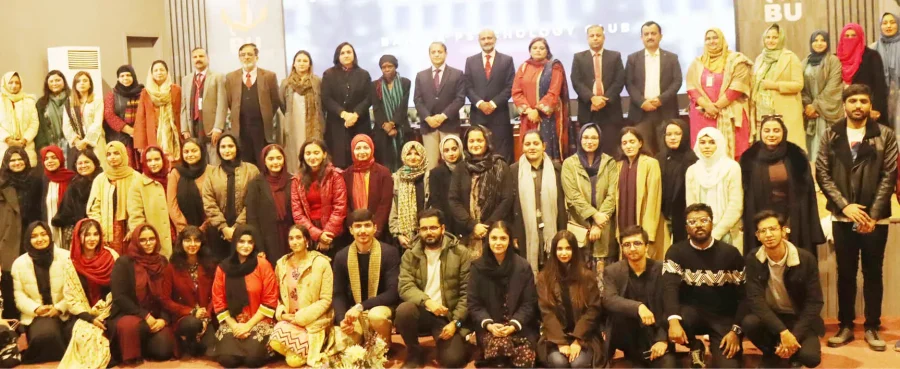Bahria school of Professional Psychology (BSPP), Bahria University, Islamabad (E-8) campus organized a panel discussion on the topic ‘Our Mind, Our Right: Mental Health as Universal Human Right’ at Bahria University. Purpose of this discussion was to commemorate mental health and to address the mental health prevention and treatment issues among youth along with the general awareness regarding the basic link between mental health and human rights.
The panellists for the panel discussion were renowned academicians, psychologists, representatives of the armed forces, and human rights activists both from national and international forums. Dr. Saima Kalsoom (Principal and head of Department BSPP) welcomed all the participants and highlighted the importance of mental health particularly about the awareness regarding basic human rights. Dr. Arooj Mujeeb (Assistant Professor, BSPP) introduced all the panellists and moderated the session.
In the beginning, Brig Dr. Shoaib Kiyani (Retd.), a practicing psychologist currently in the field of personnel assessment, selection, and counselling, of both trainees and trainers, emphasized the importance of a controlled conducive environment for psychological growth. He highlighted the roles of self-discipline and curriculum development in teaching mental health among students. He further pointed out “marriage” as a separate institution in which parenting methods should be taught beforehand for the comprehensive growth of children.
Dr. Marsela Nyawara, from the International Organization for Migration (IOM), currently working as an Emergency Health Officer, stressed the role of family challenges in the host community based on her extensive experience with migrants. She addressed the basic needs of the migrants and further suggested that during the implementation of the intervention plan, any strategy can be improved, stopped or duplicated where needed. To get sensitized towards language and cultural barriers, she added that “all migrants must be treated in a way like you want to be treated yourself”. Dr. Shahid Irfan, an MHPSS consultant and psychologist at IOM underscored the focus on primary health care and training in terms of psychological first aid which has a simple 3L rule (look, listen, and link). Dr. Shahid Irfan added that every individual in the field of psychology must get familiarized with psychological first aid.
Dr. Aneela Maqsood, chairperson National Centre for Suicide Prevention, at Fatimah Jinnah Women University, elaborated on the roles of research, well-being centres, and community services in the implementation of preventive measures among youth. According to her, initiating a dialogue should be reinforced at the institutional level to have a well-defined mechanism, the lack of which otherwise created barriers to executing any intervention plan.
Speaking on the occasion, Dr. Yasir Masood Afaq, an esteemed trainer, OD consultant, life coach and entrepreneur (finding director of the house of wellness), emphasized that the youth must identify the internal motivation for goal setting. He highlighted talking about the daily crisis and taking responsibility for learning from their surroundings. He also emphasized the role of media in secondary trauma through the exposure of violent content and he further suggested that it should be monitored and controlled carefully.
Furthermore, Dr. Aisha Kashif, a consultant health psychologist and United Nations representative stressed the importance of gaining knowledge and awareness regarding psychosocial issues and their management via psychotherapy.










